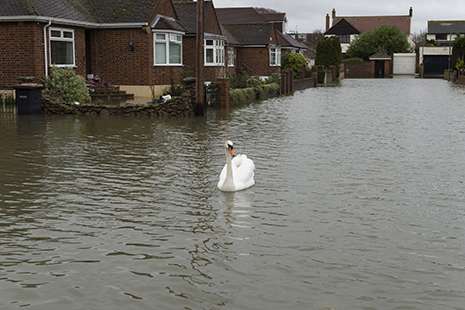Householders and businesses need to plan long-term flood prevention

Once the clean-up operation for the current flooding is complete, it is vital that the country doesn't go back into 'head in the sand' mode and finds a way to provide householders and businesses with the independent advice on flood preparation that they so desperately need. This is the view of Dr Tim Harries, leading expert on the public response to flood risk based at Kingston University.
Dr Harries is currently conducting government-funded research to find out why so few small and medium-sized businesses plan for possible flooding, and how they can be encouraged to do so. He can also explain why most householders weren't prepared for the floods.
"My research shows that in the UK, astonishingly, only eight per cent of those who know they live in a high risk area make any long-term preparations for flooding, for example by keeping a stock of sandbags, buying flood protection products or storing precious possessions in safe places," Dr Harries said. "Without specialist guidance, it's almost impossible for people to work out how to protect homes and company properties because it usually takes an expert to understand the many ways water can get into a building and what measures are needed to stop this happening. Unfortunately, such experts are in very short supply."
We can get advice from the police on how to deter burglars as well as help from the fire service on reducing fire hazards, he explained, and something similar was needed for flood risk. People needed to know who to go to for advice that they could trust. "This could be an officially recognised body or it could be a surveyor who has an official accreditation, similar to the Gas Safe qualification for plumbers," Dr Harries suggested.
The long-term impact of flood victims' mental health could also not be underestimated, Dr Harries warned.
As well as causing material disruption and destruction, floods had a dramatic emotional and social impact on people. "During a flood, people tend to experience a mixture of fear, disbelief and, perhaps surprisingly, exhilaration; next comes anger, often followed by exhaustion," he said.
"By taking away the familiar routines, object and sights that act as anchors in our daily lives, floods threaten our idea of who we are and our ability to feel safe. The road, railway line or footpath that we always thought would be there for us is suddenly inaccessible; and the home that always offered us shelter is now ridden with sewage and damp."
This explained the anger expressed by people who had been flooded and the search for scapegoats in the Environment Agency and others. "We need to find an outlet for these feelings that does not involve the destruction/distortion of the very system that is trying to protect us," Dr Harries commented.
He is now urging communities to take it upon themselves to get better at dealing with this type of weather. "Flooding is becoming part of normal life in the UK and we need to accept that and adjust to it. Previously, we've tended to view floods as 'acts of God' - something that shouldn't happen and very rarely did," he said. "As we've seen during the past months and years, however, floods are becoming ever more common in this country and don't only affect the unfortunate few."
It wasn't just those near rivers and the sea that were in danger of flooding, heavy rain can cause floods in many places that were not previously thought to be at risk. "If we accept this new reality, we will also be more able to adapt to it by using the many practical and organisational means at our disposal. None of us can afford to continue with our heads in the sand. Flooding is here to stay," he stressed.
Provided by Kingston University, London


















